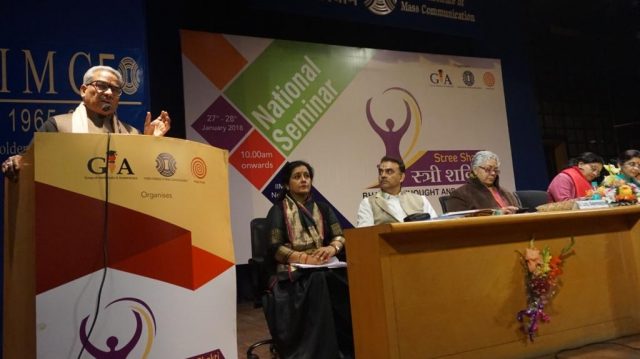
In any society, the measure of the extent of its advance towards civilization is the attitude that it has towards its women. Leaving aside about six to seven centuries when it was in the grip of colonial rule, in Indian society there has never been any discrimination against women. This was the point made by Dr.Krishn Gopal, Sah Sarkaravyahak of the Rashtriya Swayamsevak Sangh in the inaugural session of a seminar titled ‘ Stree Shakti in Bharatiya Thought and Practice’, organized by the Indian Institute of Mass Communication, the Group of Intellectuals and Academicians (GIA) and Prajna Pravah a forum of teachers in higher education.
He also pointed out that Indian society must introspect about the reasons why almost fourty percent women in India are bereft of educational opportunities and suffer from debilitating diseases like Anemia. He also commented on declining sex-ratio’s and insisted that Stree-Shakti cannot re-emerge without improving these conditions.

Dr. Krishn Gopal commented on the primacy of Stree-Shakti in Indian thought and Philosophy which assigns an equal position to men and women. He asked scholars and activists who speak about equality between men and women to consider the fact that Indian thought is not geared towards dichotomies but rather is a unifying thought. Currently the age old practice of Jauhar is gaining intense media attention due to the movie Padmavat. Dr.Krishn Gopal reminded the audience that Jauhar was one part of the tradition of Jauhar-Shakha in which men went to meet death on the battle field and women offered the supreme sacrifice rather than happily be conquered by victorious armies to be a part of large harems. This was a form of resistance and not a discriminatory practice as it is being made out to be.
Dr.Krishn Gopal outlined the ways in which in India a woman forms the pole around which the entire family revolves. She is endowed with immense qualities of patience and sacrifice. She takes care of the entire family and this is the reason why we do not have a system of sending senior citizens to old age homes. At the same time since times immemorial women have been at the peak of intellectual achievements. He gave examples of Vedic Richas that have been composed by women and the compositions of Surya Savitri. Women were educated and performed yagnopavit. All these systems were lost under colonial rule.
In the inaugural session the famous danseuse Sonal ManSingh spoke about ways in which women were central to Indian thought and practice. She traced the roots of the words Stree and Mahila both of which indicate a superior status for women. She said that only women had the strength to sustain the family, the nation and creation while facing innumerable challenges. She reminded the audience of Draupadi’s words that are enshrined in the Indian Parliament.

The Chairperson of the Women’s Commission Smt Lalita Kumaramangalam said that women today needed respect more than equality which has already been enshrined in our Constitution.
The Convener of GIA Advocate Monika Arora gave examples of Sati, Bharati the wife of Mandan Mishra and other vidushi’s like Maiyatree who represent the glorious tradition of womanhood in India. The God of Death was defeated by Savitri. She spoke of ways in which women are still restrained in traditional structures. Dr.Prachee Jawdekar CEO of Parigrah Research and Consultancy said that women were the light of Shakti and that freedom was a state of being. In his address, Prof. K G Suresh ,Director of the Indian Institute of Mass Communication focused on the need to preserve the family structure that was the backbone of the Indian Civilisation.














